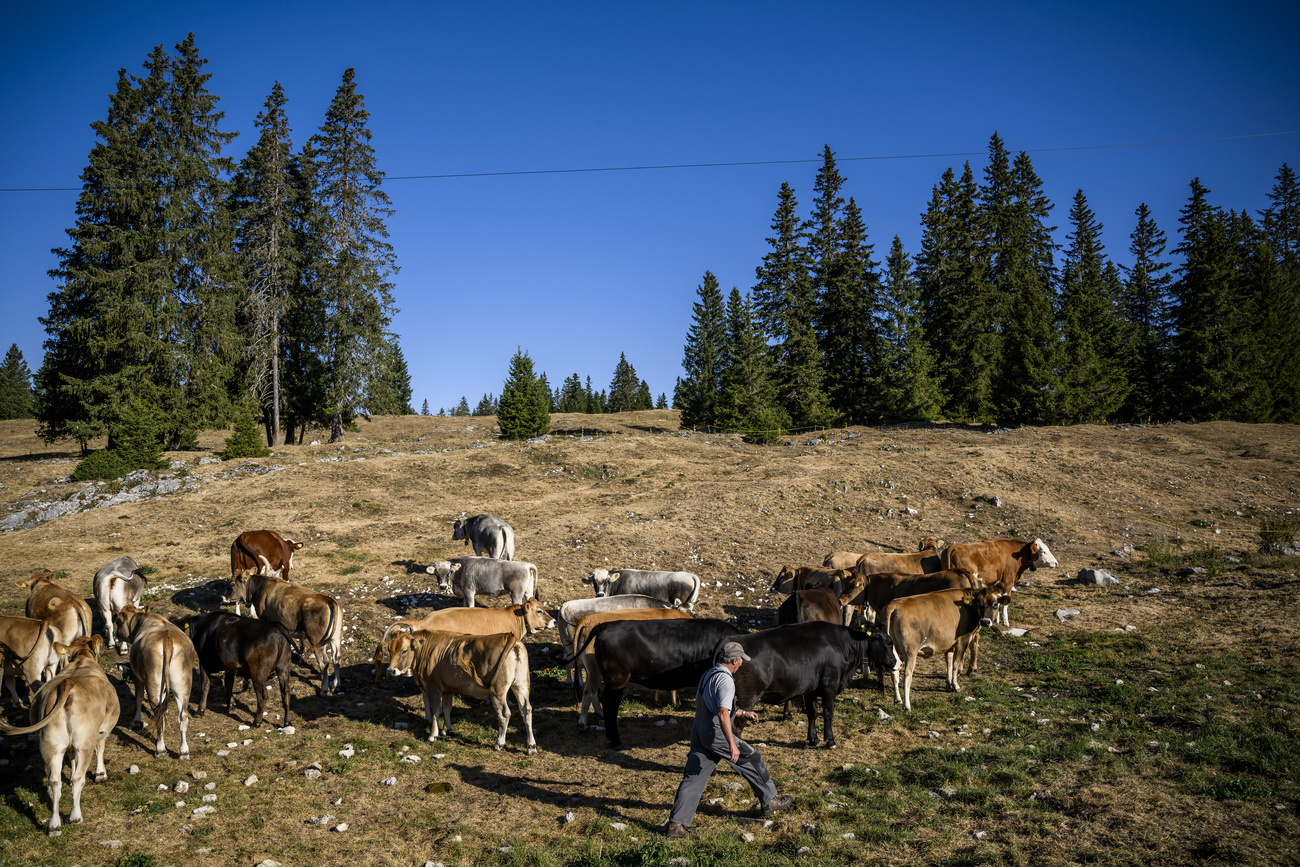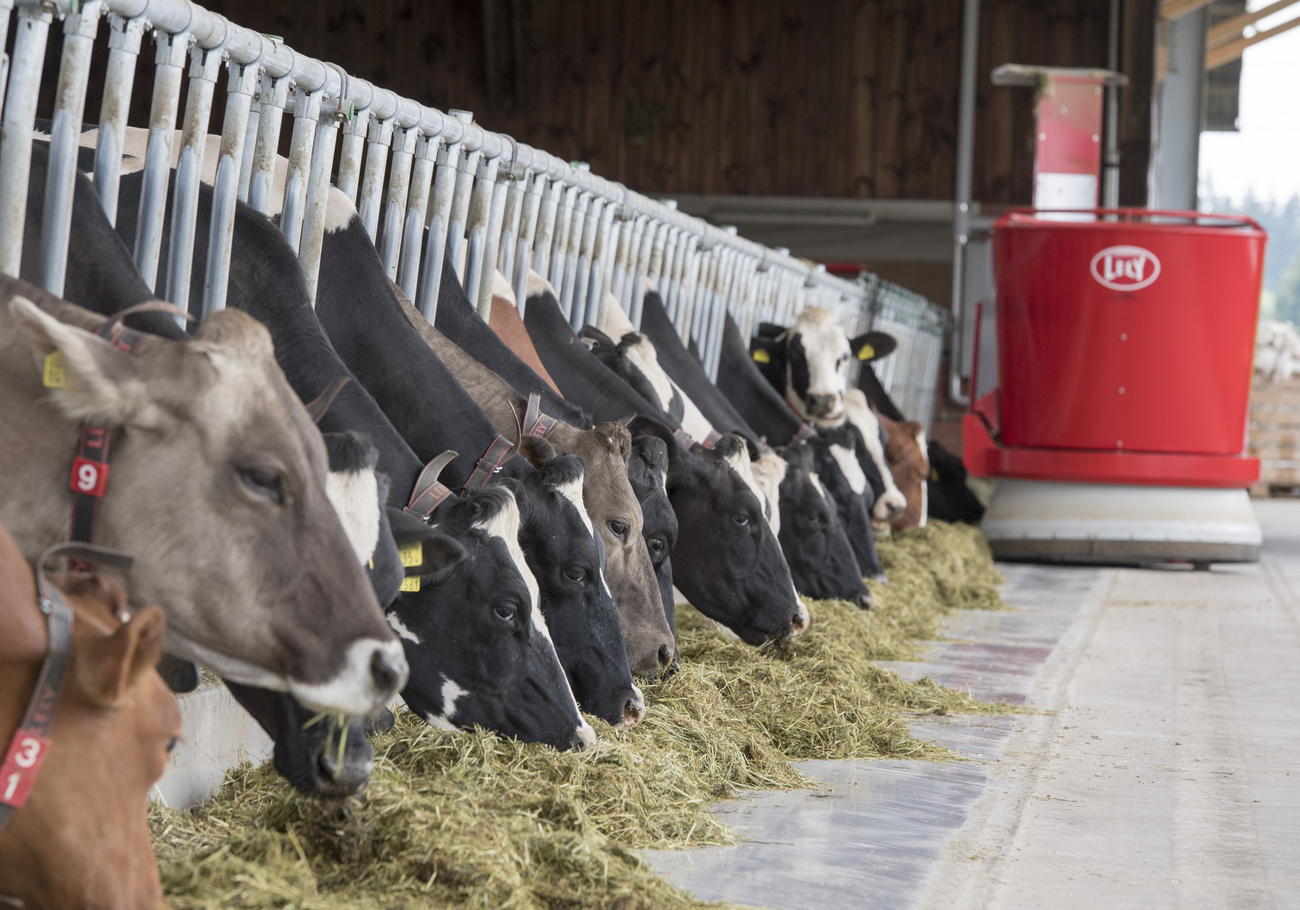Swiss agriculture remains under pressure despite success at ballot box

In rejecting a people’s initiative against intensive livestock farming, voters have reiterated their support for Swiss agriculture. But farmers cannot ignore the growing debate over the climate impact of food production.
The Swiss farmers who opposed the ban on intensive livestock production can now catch their breath. Although this political campaign was somewhat less emotional and agitated than last year’s clash over a ban on synthetic pesticides, it had a familiar feel.
Rural communities formed a largely united front against the initiative, which was coordinated by animal-rights activists and supported by several environmental organisations. The few dissenting farmers struggled to make themselves heard. Some even chose to stay silent, fearing reprisals.

More
Voters reject ethical overhaul of animal farming rules
Voters sided with the Swiss Farmers’ Federation, as they did in other recent agricultural initiatives regarding pesticides, dehorning cows and sustainable food. The Farmers’ Federation is a powerful organisation that defends the interests of Swiss farmers and maintains effective contacts in the political world.
The war in Ukraine, inflation and fears of shortages have created a national mood unfavourable to new experiments – and caution prevailed at the ballot box. Swiss citizens, as consumers, did not want to give up their food choices or reasonable prices. Once again, the threat of foreign competition proved decisive; the same argument prevailed in previous initiatives targeting agriculture. Every time stricter farming standards are proposed, the agricultural lobby asserts that reforms will open the door to imported food of lesser quality.
More
Swiss farmers are weary
This umpteenth battle over agriculture has left its mark on rural communities, despite their comfortable victory on Sunday.
“Farmers are extremely weary,” said Jérémie ForneyExternal link, a professor of anthropology at the University of Neuchâtel who specialises in agriculture. “They feel they constantly have to justify themselves and that people in cities unfairly believe they are poisoners or animal abusers. They think the urban population has an idealised image of agriculture and increasingly exacting standards for food.”
The Swiss political system makes it relatively easy for a small group of individuals to demand radical change – even without broad political support – as in the initiatives on banning pesticides and dehorning.
“Since agriculture is an easy target, it is often held solely responsible for problems that are actually more widespread and complex,” Forney explained. “So we try to impose massive constraints on farmers, while consumers’ freedom, for example, remains sacrosanct and is never questioned.”
Both victim and guilty party
Even if Switzerland’s centre-right majority endures, the agricultural sector will have to evolve if it hopes to retain the population’s sympathy.
“It’s no longer only extremist vegans who are telling us to eat less meat,” Forney said. “This position is also supported by science and by politicians. The spokespeople for conventional agriculture can no longer continue to defend themselves with simplistic arguments. They must offer alternatives and be open to dialogue.”
This summer, a clichéd Swiss image – cows grazing peacefully in a postcard landscape – developed large cracks. People were shaken by photos of desiccated pastures and by stories of farmers forced to butcher some of their animals because of insufficient fodder. The exceptional drought struck much of the population like an electric shock: the climate crisis isn’t only harming the world’s most fragile countries. It is hitting Switzerland head-on too.
Cattle contribute significantly to the global warming that intensified their suffering this summer: they produce a lot of methane, a powerful greenhouse gas.
>> What is the environmental impact of our food?
Although the campaign against intensive livestock farming focused mainly on animal welfare, the initiative’s organisers also called attention to several environmental issues. They highlighted the greenhouse-gas emissions generated by farm animals, and they denounced the illogic of destroying Brazilian rainforest in order to grow soybeans to fatten Swiss cattle.
Even though Switzerland is currently preoccupied by the energy crisis, agriculture’s impact on the climate and the environment is not going to disappear from the political agenda. Other initiatives will almost certainly be launched in the coming years.
“The good news is that despite occasional tensions, Swiss citizens have never been as engaged with agricultural issues as they are now,” Forney said. “And with the arrival of a new generation of farmers who are more willing to try new things and reach out to consumers, the agricultural world is well positioned to capitalise on the support it earned in Sunday’s vote.”
In the meantime, citizen-consumers do not need to wait for the next vote to continue expressing their opinions. Each time they shop for food, they can decide what type of farming they want to support.
Translated from French; edited by Balz Rigendinger

In compliance with the JTI standards
More: SWI swissinfo.ch certified by the Journalism Trust Initiative


You can find an overview of ongoing debates with our journalists here. Please join us!
If you want to start a conversation about a topic raised in this article or want to report factual errors, email us at english@swissinfo.ch.